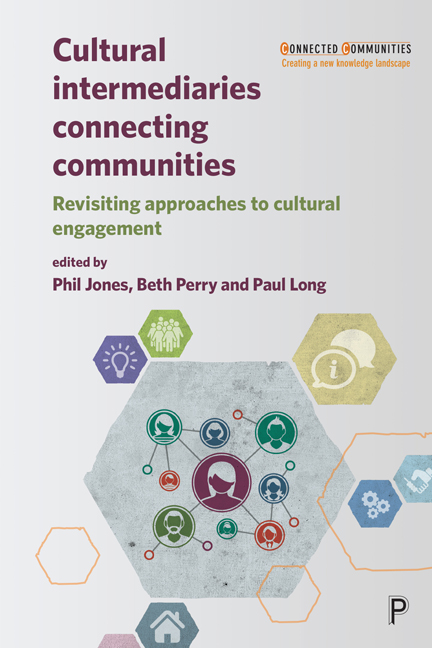Book contents
- Frontmatter
- Contents
- List of figures, tables and boxes
- Notes on contributors
- Acknowledgements
- Series editors’ foreword
- Introduction: Bringing communities and culture together
- Part One Changing contexts
- Part Two Practices of cultural intermediation
- Part Three Evaluation, impact and methodology
- Conclusion: where next for cultural intermediation?
- Index
eight - Participatory budgeting for culture: handing power to communities?
Published online by Cambridge University Press: 30 April 2022
- Frontmatter
- Contents
- List of figures, tables and boxes
- Notes on contributors
- Acknowledgements
- Series editors’ foreword
- Introduction: Bringing communities and culture together
- Part One Changing contexts
- Part Two Practices of cultural intermediation
- Part Three Evaluation, impact and methodology
- Conclusion: where next for cultural intermediation?
- Index
Summary
Introduction
Participatory budgeting (PB) partially devolves the decision-making process over local authority spending to communities and civil society groups. In 2013 it was estimated that around 1,700 local governments in more than 40 countries were practising some form of PB (Cabannes, 2015). Nonetheless, the tremendous potential of PB to radically democratise decision-making processes has hitherto only been realised on a relatively small scale.
An instrumental approach to cultural value suggests that engaging with cultural activity can build skills, confidence and community cohesion while reducing social exclusion. There is a temptation with such an approach to adopt a deficit model, suggesting that communities need to be encouraged to engage with the existing cultural offer in order to derive these benefits. PB for cultural spending, by contrast, offers a real opportunity to empower communities to leverage cultural spend into their neighbourhoods and to reshape the existing cultural offer around their needs.
PB is, however, an inherently risky process. Communities can lack capacity – both in confidence and skills – to move from ideas and debate to actually planning and realising projects. Intermediary processes are thus key to the successful delivery of PB, from getting a diverse range of voices to engage, to building confidence to express ideas, to providing the skills necessary to deliver projects. As this chapter highlights, there is a danger that publics become mere clients in an intermediary-led PB process, particularly because of pressure to ensure delivery of ‘feasible’ outputs to demonstrate value-for-money when spending public money.
Origins and implementation of participatory budgeting
Examinations of PB often focus on the victory of the Brazilian Workers’ Party (Partido dos Trabalhadores) in elections in Porto Alegre in 1989 and Belo Horizonte in 1993. In fact, some Brazilian municipalities such as Lages and Minas Gerais, had attempted to implement models of PB in the late 1970s and early 1980s, with a significant focus on providing housing for poorer workers (Souza, 2001). Indeed, in any analysis of PB it is important to bear in mind that its origins were in ensuring that basic services were provided for poorer communities. PB work in Porto Alegre and Belo Horizonte were particularly focused on street paving, sewage and housing.
- Type
- Chapter
- Information
- Cultural Intermediaries Connecting CommunitiesRevisiting Approaches to Cultural Engagement, pp. 133 - 146Publisher: Bristol University PressPrint publication year: 2019



